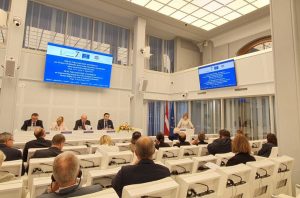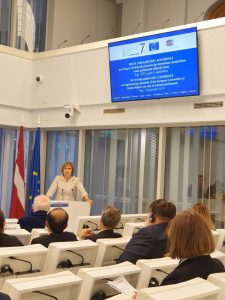Ineta Ziemele: implementation of the European Convention on Human Rights in Latvia has significantly contributed to raising awareness of human rights
On Monday, 9 September, President of the Constitutional Court Ineta Ziemele participated in the 5th Conference of the Parliamentary Assembly of the Council of Europe (hereafter – PACE) dedicated to the role of national parliaments in implementing the European Conventions on Human Rights (hereafter – ECHR) and effective execution of judgements by the European Court of Human Rights (hereafter – ECtHR).
Ineta Ziemele, as a former Judge ECtHR from Latvia, was invited to give a presentation on the interaction between ECHR and the Latvian national law. In her presentation, Ineta Ziemele examined two important aspects. She spoke about the status of ECHR within the system of Latvian law and presented her perspective on the role of ECHR in the political processes and public information space in Latvia.
As regards the status of ECHR, Ineta Ziemele drew attention to Latvia’s particular historical situation. It facilitated Latvia’s openness to international law and placing it on the constitution level so that in the case of collision of law the international legal provision prevails. Following the restoration of independence, periods of becoming aware of international law, accepting, implementing and applying it were clearly outlined. Ineta Ziemele reminded of the fact that Latvia ratified ECHR in 1997, thus demonstrating the state’s strong commitment to respecting human rights. Currently, Latvia is in a stage characterised by a deeper and more professional understanding of the principle of the supremacy of law and implementation thereof with the aim of ensuring welfare, equality, and sustainability to the people of Latvia.

President of the Constitutional Court Ineta Ziemele gave a speech on the 5th Conference of the Parliamentary Assembly of the Council of Europe. Photo: Archive of the Constitutional Court
Ineta Ziemele recognised that ECHR and ECtHR’s judicature had played an important role in Latvia’s development, transitioning from the Soviet positivism to understanding of law and legal discourse compatible with the traditions of western cultural space. She underscored that, for example, the Constitutional Court had adjusted the test of a restriction on human rights to the methodology used by ECtHR, was constantly studying the judicature of ECtHR and referred to findings expressed in ECHR.
Ineta Ziemele expressed the opinion that the implementation of ECHR in Latvia had promoted the development of human rights culture that was needed in a democratic state governed by the rule of law. ECHR and ECtHR’s judicature influence society, which has come from an environment where arbitrariness ruled and which was not used to defending its rights and is now becoming aware that a human being and human dignity is in the centre of Latvia as a country belonging to the cultural space of western law.
In the continuation of her presentation, Ineta Ziemele spoke about the parliament’s role in executing the standards of ECHR. She noted that the parliament directly reflected the general public understanding of human rights, separation of powers and rule of law. ECHR also shapes the legal framework of the legislative process in Latvia.
Ineta Ziemele underscored that the main aim of legislation was the sustainability of the nation and the state. In her opinion, high-quality legislative process that complies with the principle of good legislation is transparent, comprehensible and, with certain points of reference, for instance, ECtHR, can promote greater public trust in democratic processes and the state in general.
In conclusion, Ineta Ziemele urged members of parliaments to engage more actively in discussions about issues of human rights, rule of law and separation of powers, thus also fostering public awareness of these matters.

President of the Constitutional Court Ineta Ziemele. Photo: Archive of the Constitutional Court.
The conference was organised by PACE, in co-operation with the Saeima of the Republic of Latvia. Representatives from the parliaments of Armenia, Denmark, Estonia, Finland, Georgia, Island, Latvia, Lithuania, Poland and Sweden were among the attendees, they met with international experts and members of PACE’s Legal Affairs and Human Rights Committee.
About PACE
PACE is a statutory body of the Council of Europe focusing on human rights, protection of democracy and a state governed by the rule of law, promoting awareness and development of the European cultural identity and diversity. PACE is involved in resolving relevant matters for the European society as well as reinforcing democratic stability in Europe by supporting political, legislative and constitutional reforms. Since 2012, PACE has organised a number of conferences for members of parliaments from the Council of Europe Member States to expand their knowledge about ECHR and ECtHR’s judicature.



